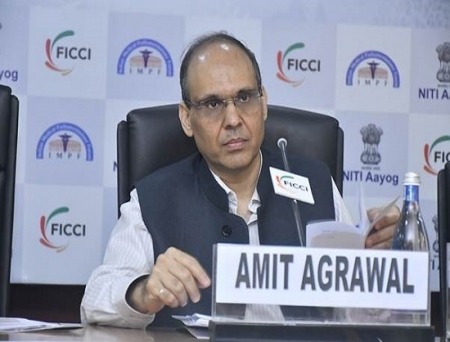PLI Scheme Brings Down Rare Disease Treatment Costs from Crores to Lakhs: Pharma Secretary

The Production Linked Incentive (PLI) Scheme for pharmaceuticals has significantly reduced the cost of treating rare diseases in India, bringing expenses down from crores to just a few lakhs, said Amit Agrawal, Secretary, Department of Pharmaceuticals, Ministry of Chemicals and Fertilizers.
Speaking at the Rare Diseases Conference 2025 held at the FICCI Auditorium, Agrawal highlighted that rare diseases were included as a focus area under the PLI Scheme, supporting eight drugs for rare conditions.
Among them, Eliglustat for Gaucher’s Disease has seen treatment costs fall from INR 1.8–3.6 crore annually to INR 3–6 lakh. Other supported medicines include Trientine for Wilson’s Disease, Nitisinone for Tyrosinemia Type 1, and Cannabidiol for Lennox–Gastaut Syndrome.
He noted that such tangible reductions in treatment costs demonstrate the transformative potential of targeted policy interventions.
Agrawal commended the organisers for bringing focus to an issue of growing significance that has historically not received adequate attention. He underlined that although rare diseases may appear infrequent individually, collectively they affect nearly one in every twenty individuals—around 5 percent of the population—making them a major public health concern. He emphasised that the rare disease challenge should be seen through a human lens and as a question of inclusion, not merely a medical or technical problem.
Drawing on the Prime Minister’s inclusive vision for Divyangjan, the Secretary called for joint efforts from government, industry, academia, and civil society to address the multifaceted burden faced by patients and caregivers.
He also echoed the Prime Minister’s Independence Day address, which urged India to pioneer affordable medicines for global welfare. He recalled, “We are known as the pharmacy of the world, but isn’t it the need of the hour to invest in research and development? Shouldn’t we be the ones providing the best and most affordable medicines for the welfare of humanity?”
Agrawal further encouraged corporates to factor in rare disease patients under their CSR initiatives and patient assistance programmes, considering the heavy financial and emotional burden on affected families. He urged all stakeholders to evaluate their policies, regulations, funding models and programme designs through the lens of inclusivity, and suggested exploring special pathways or regulatory exemptions to address the unique needs of the rare disease community.
Concluding his address, Agrawal said he looked forward to the recommendations and policy insights emerging from the day’s deliberations and expressed interest in learning from global best practices to strengthen India’s policy framework for rare diseases.
Affordable medicines Amit Agrawal, Secretary, Department of Pharmaceuti Cost of treating rare diseases in India Gaucher’s Disease Production Linked Incentive (PLI) Scheme for pharm Rare diseases Rare Diseases and Orphan Drugs Rare Diseases Conference 2025 Tyrosinemia Type 1 Wilson’s Disease
Last news about this category
We use our own and third party cookies to produce statistical information and show you personalized advertising by analyzing your browsing, according to our COOKIES POLICY. If you continue visiting our Site, you accept its use.
More information: Privacy Policy

















